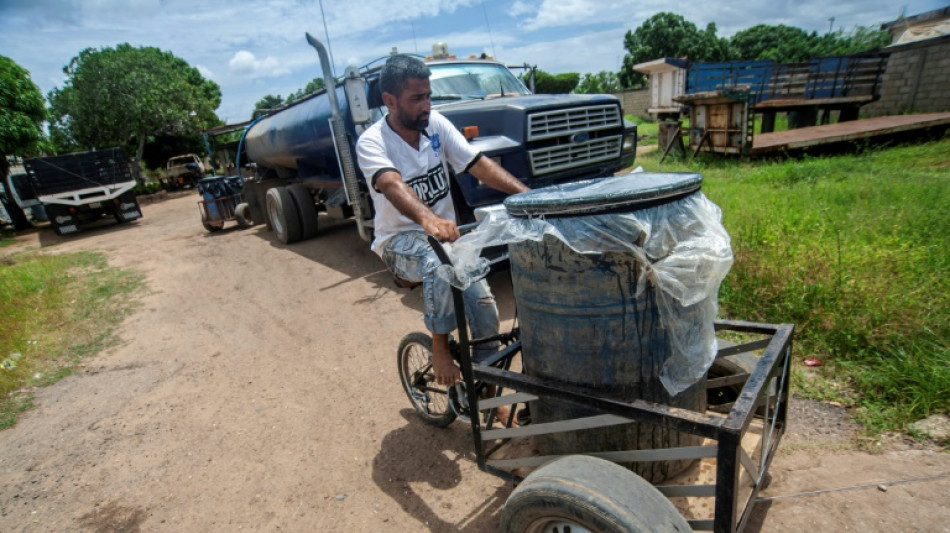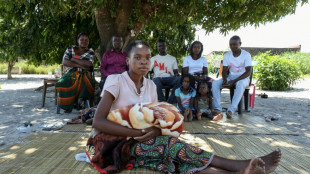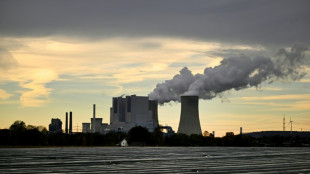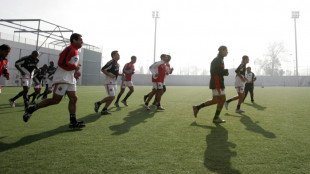
-
 'Extraordinary' trove of ancient species found in China quarry
'Extraordinary' trove of ancient species found in China quarry
-
Villa's Tielemans ruled out for up to 10 weeks

-
 Google unveils AI tool probing mysteries of human genome
Google unveils AI tool probing mysteries of human genome
-
UK proposes to let websites refuse Google AI search

-
 'I wanted to die': survivors recount Mozambique flood terror
'I wanted to die': survivors recount Mozambique flood terror
-
Trump issues fierce warning to Minneapolis mayor over immigration

-
 Anglican church's first female leader confirmed at London service
Anglican church's first female leader confirmed at London service
-
Germany cuts growth forecast as recovery slower than hoped

-
 Amazon to cut 16,000 jobs worldwide
Amazon to cut 16,000 jobs worldwide
-
One dead, five injured in clashes between Colombia football fans

-
 Dollar halts descent, gold keeps climbing before Fed update
Dollar halts descent, gold keeps climbing before Fed update
-
US YouTuber IShowSpeed gains Ghanaian nationality at end of Africa tour

-
 Sweden plans to ban mobile phones in schools
Sweden plans to ban mobile phones in schools
-
Turkey football club faces probe over braids clip backing Syrian Kurds

-
 Deutsche Bank offices searched in money laundering probe
Deutsche Bank offices searched in money laundering probe
-
US embassy angers Danish veterans by removing flags

-
 Netherlands 'insufficiently' protects Caribbean island from climate change: court
Netherlands 'insufficiently' protects Caribbean island from climate change: court
-
Fury confirms April comeback fight against Makhmudov

-
 Susan Sarandon to be honoured at Spain's top film awards
Susan Sarandon to be honoured at Spain's top film awards
-
Trump says 'time running out' as Iran rejects talks amid 'threats'

-
 Spain eyes full service on train tragedy line in 10 days
Spain eyes full service on train tragedy line in 10 days
-
Greenland dispute 'strategic wake-up call for all of Europe,' says Macron

-
 'Intimidation and coercion': Iran pressuring families of killed protesters
'Intimidation and coercion': Iran pressuring families of killed protesters
-
Europe urged to 'step up' on defence as Trump upends ties

-
 Sinner hails 'inspiration' Djokovic ahead of Australian Open blockbuster
Sinner hails 'inspiration' Djokovic ahead of Australian Open blockbuster
-
Dollar rebounds while gold climbs again before Fed update

-
 Aki a doubt for Ireland's Six Nations opener over disciplinary issue
Aki a doubt for Ireland's Six Nations opener over disciplinary issue
-
West Ham sign Fulham winger Traore

-
 Relentless Sinner sets up Australian Open blockbuster with Djokovic
Relentless Sinner sets up Australian Open blockbuster with Djokovic
-
Israel prepares to bury last Gaza hostage

-
 Iran rejects talks with US amid military 'threats'
Iran rejects talks with US amid military 'threats'
-
Heart attack ends iconic French prop Atonio's career

-
 SKorean chip giant SK hynix posts record operating profit for 2025
SKorean chip giant SK hynix posts record operating profit for 2025
-
Greenland's elite dogsled unit patrols desolate, icy Arctic

-
 Dutch tech giant ASML posts bumper profits, cuts jobs
Dutch tech giant ASML posts bumper profits, cuts jobs
-
Musetti rues 'really painful' retirement after schooling Djokovic

-
 Russian volcano puts on display in latest eruption
Russian volcano puts on display in latest eruption
-
Thailand uses contraceptive vaccine to limit wild elephant births

-
 Djokovic gets lucky to join Pegula, Rybakina in Melbourne semi-finals
Djokovic gets lucky to join Pegula, Rybakina in Melbourne semi-finals
-
Trump says to 'de-escalate' Minneapolis, as aide questions agents' 'protocol'

-
 'Extremely lucky' Djokovic into Melbourne semi-finals as Musetti retires
'Extremely lucky' Djokovic into Melbourne semi-finals as Musetti retires
-
'Animals in a zoo': Players back Gauff call for more privacy

-
 Starmer heads to China to defend 'pragmatic' partnership
Starmer heads to China to defend 'pragmatic' partnership
-
Uganda's Quidditch players with global dreams

-
 'Hard to survive': Kyiv's elderly shiver after Russian attacks on power and heat
'Hard to survive': Kyiv's elderly shiver after Russian attacks on power and heat
-
South Korea's ex-first lady jailed for 20 months for taking bribes

-
 Polish migrants return home to a changed country
Polish migrants return home to a changed country
-
Dutch tech giant ASML posts bumper profits, eyes bright AI future

-
 South Korea's ex-first lady jailed for 20 months for corruption
South Korea's ex-first lady jailed for 20 months for corruption
-
Minnesota congresswoman unbowed after attacked with liquid


Drilling for water in Venezuela's parched oil town
In Venezuela's oil capital of Maracaibo, a drilling frenzy has led to dozens of new wells -- but the valuable liquid being pumped out is just water, not petroleum.
In a symbol of the woes of Venezuela's crumbling economy, the once flourishing oil town of 2 million people is parched.
Experts blame the nationwide shortage of drinking water on corruption and years of underinvestment and mismanagement by national and local governments, resulting in frequent water cuts.
The corroding infrastructure has led to schools, homes, businesses, churches and health centers all digging their own wells -- at a huge expense.
A private well costs between $1,000 and $6,000, a fortune in the sanctions-hit Caribbean country where the minimum monthly wage is around $200.
As a result, homes that come with a ready-made well and generator -- Venezuelans also live with recurring power cuts -- sell for a premium.
While water rationing has been in place in Venezuelan cities for years, the situation in Maracaibo has become critical, as pumping stations break down, old pipes leak and reservoirs run dry.
- 'It's a blessing' -
No water came out of the taps in certain parts of the city for over a month at the start of 2025.
Manuel Palmar and six other families in the lower-middle-class neighborhood of Ziruma saw the writing on the wall four years ago.
They each paid $2,500 to build a 12-meter-deep (40-foot) well, which can store up to about 80,000 liters (21,000 gallons) of spring water each week.
Now when Palmar turns on the tap, water gushes out for free.
The water is not fit for drinking due to its high salinity -- saltwater from the Caribbean Sea seeps into Lake Maracaibo, a coastal lake used as a freshwater source -- but "it's perfect for washing clothes and flushing toilets," he explained.
"It's a blessing!" the 34-year-old accountant said.
There's a solution of sorts for every budget.
Some residents fill 200-liter drums at official filling stations or communal taps for $2-$3.
Others order a water truck to fill their building's tank for between $40 and $60.
Some even recycle the water produced by the tropical city's ubiquitous air conditioners or collect rainwater.
But those are all quick fixes.
- Brackish drinking water -
Over the past six years, more and more residents have begun digging wells to guarantee their long-term supply for the future.
Gabriel Delgado has built about 20 wells in Maracaibo, including at a heart disease clinic and four private schools.
He also built one at his mother-in-law's home: a gray cement cylinder, one and a half meters in diameter, buried under metal sheeting and rocks.
Cobwebs dangle just above the water level, but as soon as he activates the pump, water pours forth.
It's crystal clear, unlike the yellowish liquid that flows from the city's taps during the rainy season, and Delgado eagerly sips it.
Venezuelans must receive authorization from health and environmental authorities before drilling a well, and they are required to provide water samples for testing to ensure it is fit for consumption once it's built.
But not everyone bothers.
Javier Otero, head of Maracaibo's municipal water department, told AFP that he had come across shallow artisanal wells built near sewers or polluted ravines.
"Some people drink water that is not potable, that is brackish," he told AFP.
The municipality has built seven wells to supply Maracaibo's poorer neighborhoods.
F.Stadler--VB


